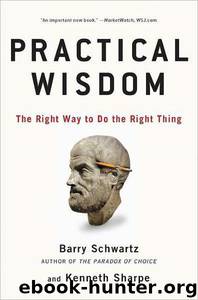Practical Wisdom: The Right Way to Do the Right Thing by Barry Schwartz & Kenneth Sharpe

Author:Barry Schwartz & Kenneth Sharpe
Language: eng
Format: mobi, epub
Tags: Non-Fiction, Business, Azizex666, Philosophy, Self Help, Psychology
ISBN: 9781594487835
Publisher: Riverhead Trade
Published: 2010-12-30T05:00:00+00:00
TITLE: Reading and enjoying literature/words with “b”
TEXT: The Bath
LECTURE: Assemble students on the rug or reading area.... Give students a warning about the dangers of hot water.... Say, “Listen very quietly as I read the story.” . . . Say, “Think of other pictures that make the same sound as the sound bath begins with.”
Her students sat cross-legged on a corner rug. The children’s book The Bath was not available, so Ms. Jabbari chose Jesse Bear, What Will You Wear? But no matter. She still began with the script, reminding them: “It’s always safe to have an adult around when you take your bath.”
Supporters of lockstep curricula and high-stakes standardized tests were not out to undermine the wisdom, creativity, and energy of good teachers. The scripted curricula and tests were aimed at improving the performance of weak teachers in failing schools—or forcing them out. If lesson plans were tied to tests, teachers’ scripts would tell them what to do to get the students ready. If students still failed, the teachers could be “held accountable.” Equality would seemingly be achieved (no child left behind) by using the same script, thus giving the same education to all students. But this also meant that all teachers, novice or expert, weak or strong, would be required to follow the standardized system.
Teachers on the front lines often point to the considerations left out of the teach-to-test paradigm. Tests are only one indicator of student learning, and poor performance on tests has other causes aside from poor teaching—poorly funded urban schools, students from poor or immigrant backgrounds with few resources at home and sometimes little or no English, overcrowded classrooms with not enough teachers, poor facilities, lack of books and equipment, students with learning problems or other disabilities. But one of the chief criticisms many teachers make is that the system is dumbing down their teaching. It is de-skilling them. It is not allowing them—or teaching them—the judgment they need to do good teaching. They are encouraged, says education scholar professor Linda Darling-Hammond, “to present material that [is] beyond the grasp of some and below the grasp of others, to sacrifice students’ internal motivations and interests in the cause of ‘covering the curriculum,’ and to forgo the teachable moment, when students [are] ready and eager to learn, because it [happens] to fall outside of the prescribed sequence of activities.” Sooner or later, “turning out” kids who can turn out the right answers the way you turn out screws, or hubcaps, comes to seem like normal practice. Worse, it comes to seem like “best practice.”
Download
Practical Wisdom: The Right Way to Do the Right Thing by Barry Schwartz & Kenneth Sharpe.epub
This site does not store any files on its server. We only index and link to content provided by other sites. Please contact the content providers to delete copyright contents if any and email us, we'll remove relevant links or contents immediately.
The remains of the day by Kazuo Ishiguro(7565)
Tools of Titans by Timothy Ferriss(6957)
The Black Swan by Nassim Nicholas Taleb(6201)
Inner Engineering: A Yogi's Guide to Joy by Sadhguru(5905)
Giovanni's Room by James Baldwin(5889)
The Way of Zen by Alan W. Watts(5808)
The Six Wives Of Henry VIII (WOMEN IN HISTORY) by Fraser Antonia(4797)
The Power of Now: A Guide to Spiritual Enlightenment by Eckhart Tolle(4762)
Astrophysics for People in a Hurry by Neil DeGrasse Tyson(4626)
Asking the Right Questions: A Guide to Critical Thinking by M. Neil Browne & Stuart M. Keeley(4591)
12 Rules for Life by Jordan B. Peterson(3742)
The Ethical Slut by Janet W. Hardy(3508)
Skin in the Game by Nassim Nicholas Taleb(3476)
Housekeeping by Marilynne Robinson(3407)
The Art of Happiness by The Dalai Lama(3389)
Double Down (Diary of a Wimpy Kid Book 11) by Jeff Kinney(3283)
Skin in the Game: Hidden Asymmetries in Daily Life by Nassim Nicholas Taleb(3270)
Walking by Henry David Thoreau(3236)
12 Rules for Life: An Antidote to Chaos by Jordan B. Peterson(3209)
